Share
Working at ESO
Are you interested in working in areas of frontline technology and in a stimulating international environment? Do you feel your profile matches our requirements? Learn more about our current vacancies and apply online. Read more..
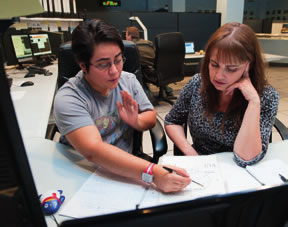
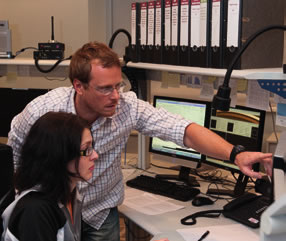

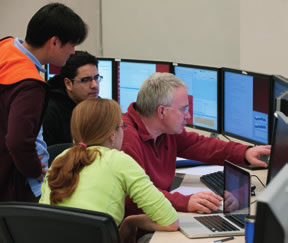

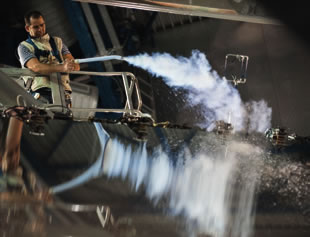
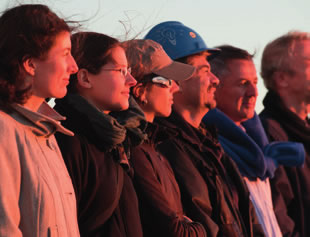

The Atacama Large Millimeter/submillimeter Array (ALMA) is the world's preeminent facility for millimeter and submillimeter-wave astronomy with transformational capabilities to study the origin of galaxies, stars, and planets. ALMA consists of 66 antennas located on the Chajnantor plateau, 5000 meters altitude in northern Chile, and equipped with receivers covering atmospheric windows between 30 and 950 GHz.
The Atacama Large Millimeter/submillimeter Array (ALMA), an international astronomy facility, is a partnership of the European Organisation for Astronomical Research in the Southern Hemisphere (ESO), the U.S. National Science Foundation (NSF) and the National Institutes of Natural Sciences (NINS) of Japan in cooperation with the Republic of Chile. ALMA is funded by ESO on behalf of its Member States, by NSF in cooperation with the National Research Council of Canada (NRC) and the National Science Council of Taiwan (NSC) and by NINS in cooperation with the Academia Sinica (AS) in Taiwan and the Korea Astronomy and Space Science Institute (KASI). ALMA continued development and operations are led by ESO on behalf of its Member States; by the National Radio Astronomy Observatory (NRAO), managed by Associated Universities, Inc. (AUI), on behalf of North America; and by the National Astronomical Observatory of Japan (NAOJ) on behalf of East Asia.
ALMA Head of Science Operations
Santiago
Deadline 24/11/2017
The Joint ALMA Observatory (JAO) is seeking a senior science manager, with extensive experience, to lead the Department of Science Operations (DSO), which is responsible for the science operations of the international ALMA radio astronomy observatory in Chile. This is an outstanding opportunity to lead the scientific operations of the most ambitious ground-based observatory operational in the world today, delivering unique scientific data to a world-wide user community of approximately 4000 professional astronomers.
The Head of DSO is responsible for the management and leadership of the scientific program from data acquisition to data delivery, observatory calibration, and improvements to overall performance of the observatory. The Head of DSO is expected to manage, directly or indirectly, a team of approximately 56 staff members.
The Head of DSO will be responsible for the operation of the array that requires careful attention, and coordination and consultation between JAO and the Executives (ESO, AUI/NRAO, NAOJ). The Head of DSO is central in leveraging ALMA's dedicated development line to ensure new capabilities and instruments are developed to maintain ALMA's position as a cutting edge astronomical facility. The Head of DSO will assess the potential consequences of any proposed development idea on ALMA operations and will help plan the Science Operations portion of the integration and commissioning plan for any approved ALMA Development projects.
The Head of DSO will report to the ALMA Deputy Director and will be a member of the JAO's Core Management Team where it is expected that he/she will make key contributions to strategic planning, policy development and implementation, and the overall decision-making at the JAO to ensure policies, procedures and long-term goals are adopted by DSO staff and monitored for effectiveness.
Duties and Responsibilities:
1. Lead the team responsible for science operations outcomes, science program optimization, data quality assurance and monitoring, and associated budget and staffing.
2. Deliver all JAO science operations outcomes, including:
- Collection, processing and delivery of scientific data;
- Observation queue;
- Commissioning and validation of upgrades of the array;
- Up-to-date Quality Control of the scientific and calibration data;
- Identification of opportunities to improve the scientific performance of the array;
- Execution, maintenance and update of the Observatory Calibration Plan.
3. Lead a high performing and diverse team and keep it highly engaged through the implementation of policies and people management best practices, including professional development and training of DSO staff. Empower the managers and supervisors to create high performing sub-teams, while maintaining the unity within the team.
4. Optimize and execute the science program, including:
- The approved projects submitted by the community;
- Necessary calibrations, which needs to be optimized given weather, testing, and general improvements in array operations;
- Close coordination with the Heads of the ALMA Departments of Computing and Engineering, as well as the Observatory Scientist and Observatory System Engineer, to provide input on optimal program execution and completion.
5. Oversee scientific data quality assurance, including trend analysis and fault reporting.
6. Monitor the array status and provide science program requirements to the Deputy Director for integration and eventual implementation with the Departments of Engineering and Computing activities.
7. Coordinate the testing, validation, and acceptance of relevant software for science operations.
8. Manage the DSO resources, including the budget, staff plan, and the allocation of staff to tasks and projects.
9. Lead an integrated team consisting of the science operations leads from the three regional ALMA Support Centers, which provide considerable portions of ALMA science operations. This integrated team's role includes:
- Coordinating science operations globally;
- Making important decisions and recommendations regarding how to serve the user community and execute the global aspects of ALMA Science Operations.
10. Maintain awareness of, and some active participation in the research astronomy community. To this end, the Head of DSO will have support and a fraction of time reserved for active research that will depend on the applicant contractual conditions.
Requirements/Qualifications
Applicants for this position should fulfill the following requirements:
1. PhD in Astronomy, Physics, or a closely-related discipline;
2. At least eight years of operations management experience in a large research, observatory or laboratory facility, including:
- Management responsibility of medium to large groups, with multiple critical tasks;
- A proven track record in planning and delivering timely outcomes;
- Excellent leadership and communication skills to lead a high performing and diverse team
- Effective interpersonal and communication skills relevant to working within a multi-cultural international partnership,
- Proven ability to operate in complex international organizational structures and to integrate organizational strategy and departmental goals;
- Proven capability to establish, identify and communicate a broad and compelling organizational direction;
- Excellent managerial and leadership skills;
- Demonstrated ability to perform and/or oversee the analysis of complex policy and program issues in areas such as human resources, finance, logistics and administration;
- Strong ability to lead, supervise, mentor, and evaluate staff with diverse skills and cultural backgrounds, as well as to design training and skills-enhancement initiatives that ensure effective staff development;
- Fluency in English (oral and written) is essential; knowledge of Spanish will be an asset.
- Due to travel requirements and work at high altitudes, a successful high altitude medical check is a necessary condition of employment for this position.
3. Previous research experience in astronomically relevant subfields is highly preferred.
Duty Station / Location of Position
The duty station is the Santiago Office with frequent ('20%) travel to the ALMA operations site near San Pedro de Atacama: the Operations Support Facility (OSF) at 2900 m and the Array Operations Site (AOS) located on the nearby Llano de Chajnantor at 5000 m altitude. Occasional international travel will be required as well.
Starting Date
As soon as possible.
Contract
The successful candidate may request contract offers from any or all of ESO, AUI/NRAO and NAOJ. The selected candidate will be assigned to the Head of DSO position at the JAO for an initial fixed term duration of three years subject to the successful completion of the probation period with the possibility of extension, subject to individual performance and organizational requirements.
Remuneration
The remuneration will be negotiated between the selected candidate and the employing Executive, according to the relevant rules and regulations. If applicable, an expatriation allowance and other allowances will be provided.
How to apply
Qualified scientists with extensive relevant experience are invited to apply by submitting an application to one of the ALMA Executives. Applications must be written in English and include:
- Cover Letter addressing the requirements detailed above;
- Curriculum Vitae;
- Research interest statement and list of publications;
- Three reference letters.
Applicants submitting their application to ESO are invited to apply online: http://recruitment.eso.org/. Reference letters should be sent to vacchile@eso.org.
Applicants submitting their application to AUI/NRAO are invited to apply online: http://jobs.jobvite.com/nrao/jobs. Reference letters should be sent to Joyce Ivory "jivory@nrao.edu".
Applicants submitting their application to NAOJ are invited to send their application and reference letters to apply-alma-head-dso-2018@nao.ac.jp.
The initial deadline for receipt of applications to be considered for the position is November 24, 2017. However, applications will continue to be accepted until the position is filled.
